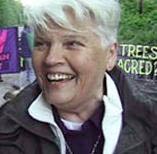
Taser strikes kill cow
April 16, 2006 in Opinion
Last week, a cow wandering near the Spokane Valley Mall in Washington state died after it was repeatedly Tasered by police. Last year a dog in Oregon died after repeated Taser strikes.
How do the police, coroners and other Taser advocates explain these animal deaths? It’s a pretty safe bet that neither of these animals were high on cocaine when they were zapped. I’m no animal psychologist, but I doubt whether “excited delirium” played a role either. Is it possible that, just maybe, the 50,000 volts of electricity pulsing through their bodies may have had fatal consequences?
More than 200 North Americans have died after being Tasered by police, 69 last year alone. Although there have been 14 Canadian fatalities, no independent safety tests have ever been done in this country.
posted by Cameron Ward
Cathedral Grove victory: no parking lot in paradise
April 6, 2006 in Opinion
The British Columbia government has announced that it will employ “traffic calming” in the area of Cathedral Grove, rather than bulldozing old growth forest to create a parking lot. The announcement ends a two year struggle by environmentalists and residents opposed to the government’s original plan.
We are proud to have played a small role in this important victory, having successfully opposed the BC government’s application for an injunction that would have had the effect of removing protesters from the public lands where the parking lot was to have been built.
In May of 2004, the late Madam Justice Gina Quijano dismissed the injunction application in a courageous decision that bucked conventional judicial trends.
Read Madam Justice Quijano’s 2004 decision here:
2004 BCSC 720 British Columbia (Attorney General) v. Sager et al
posted by Cameron Ward
Police complaint system needs overhaul: submission
March 31, 2006 in News
In a sharply worded submission to Josiah Wood, Q.C., the former Court of Appeal justice who is conducting a review of how public complaints against municipal police officers are handled, we have called the current system “an unmitigated failure” and have recommended urgent reform.
At least 22 people have died in police detention or custody in British Columbia in the last four years, yet no police officer has been charged or even disciplined in any of those serious cases. We feel the reason for inaction is that police are permitted to investigate themselves in this province, thereby compromising any further decision-making processes.
The problem is especially acute in Vancouver, which has had 10 police involved deaths since May of 2002. In our submission, we cite our direct experience with corrupt investigations conducted by VPD investigators in the Hyatt, Berg, Bagnell and Stevenson cases in support of our position that the police should no longer be allowed to investigate themselves in cases of serious injury or death.
This view is hardly earth-shattering, yet successive governments refuse to modernize the system. As a result, the families of those who die at the hands of the police feel cheated by the justice system and the complaint process, and come away feeling frustrated, disillusioned and bitter. Our politicians must find the political will to radically change the process, before the public loses faith in the legal system as a whole.
posted by Cameron Ward
Betty Krawczyk's appeal dismissed
March 30, 2006 in Opinion
The British Columbia Court of Appeal has dismissed Betty Krawczyk’s appeal of her conviction for criminal contempt of court arising from her 2003 protest activities. In May of 2003, Ms. Krawczyk sat on a public logging road as a symbolic demonstration of her displeasure with the government’s forestry policies and the industry’s clearcut logging practices.

“Betty K” was arrested for allegedly violating a civil injunction order obtained by Hayes Forest Services Limited and held in jail for several weeks while the Crown and the company tried to decide what, if anything, to do with her.
Ms. Krawczyk, then aged 75, spent a total of four and one half months in jail awaiting trial. Upon “conviction” she was sentenced to a further six months behind bars. Since she was never charged with a criminal offence under the Criminal Code, bail legislation did not apply.
On appeal, we argued that the process used to imprison Ms. Krawczyk for almost a year as punishment for the physical act of sitting on a public road violated her constitutional rights. The Court of Appeal disagreed. A further appeal to the Supreme Court of Canada is being considered.
Read the Court of Appeal decision here:
2006 BCCA 156 Hayes Forest Services Limited v_ Krawczyk
posted by Cameron Ward
Judgment reserved in Berg Appeal
March 22, 2006 in News
The Court of Appeal has reserved judgment in Julie Berg’s appeal, wherein she seeks an order that the decision of a Police Act adjudicator be set aside. Following a lengthy public hearing, which neither Ms. Berg nor her lawyer participated in, the adjudicator decided that “it has not been proved to the degree necessary that the respondent [Cst. Bruce-Thomas of the VPD] committed the disciplinary default of abuse of authority on the person of Jeffrey Michael Berg causing his death.”
Julie Berg’s appeal was opposed by no fewer than five lawyers representing the Police Complaint Commissioner, Cst. Bruce-Thomas and the British Columbia Association of Municipal Chiefs of Police. The appeal was heard by Chief Justice Finch, Madam Justice Rowles and Mr. Justice Mackenzie over two days, March 20 and 21, 2006, and judgment was reserved.
….
Julie Berg’s brother Jeff Berg died on October 24, 2000 after being confronted by Cst. Bruce-Thomas of the Vancouver Police Department. The death was investigated by Vancouver Police Department investigators, including Insp. Rob Rothwell, a car racing teammate of Cst. Bruce-Thomas. On December 9, 2002, Regional Crown Counsel advised the Berg family that “a criminal prosecution is not appropriate” and, on December 19, 2002, Insp. Rothwell advised the family that “no further action is warranted”.
According to public statements made by Dana Urban, Q.C., an experienced former Crown Counsel, “the Vancouver Police Department’s investigation of itself in the best view, best view, could be described as incompetent.” Police Complaint Commissioner Dirk Ryneveld, Q.C., also an experienced former Crown Counsel, later published a report dated June 1, 2005 stating that his office experienced “interference and resistance from some members of the VPD Internal Investigation Section” on this case and that his office was “stymied” by their actions. Mr. Ryneveld concluded that “the real systemic problem appears to be with VPD management and its accountability within the police complaint process.”
In light of these comments, the public may well question why police in the province of British Columbia are still allowed to investigate themselves.

Jeff Berg: 1962-2000







 Follow this site using RSS
Follow this site using RSS

